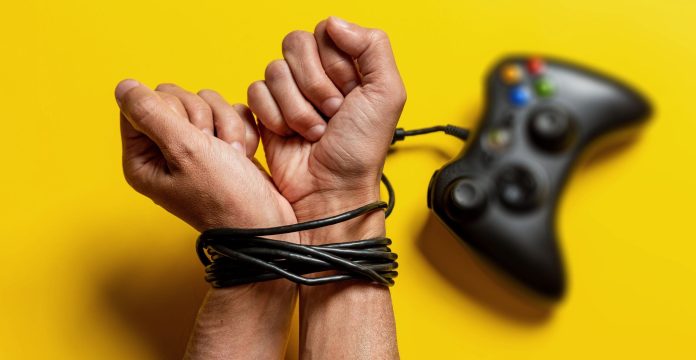From Pong and Pac-Man to Minecraft and Fortnight, video games have always been a lot of fun. Sometimes, however, gamers become fixated, compulsive or — worse — spiral into a full-blown gaming disorder marked by isolation, distress, interpersonal conflicts and severe neglect of responsibilities. But are the games to blame?
A new study by brain scientists Kylie Falcione and René Weber at UC Santa Barbara’s Media Neuroscience Lab helps answer that question, and their findings may have profound impacts on treatment options for gaming addicts. Their research, “Psychopathology and Gaming Disorder in Adolescents,” was recently published in JAMA Network Open, an open-access, peer-reviewed international medical journal of the American Medical Association.
“We’ve known for some time that gaming disorder exists, but we’ve also known that not every gamer develops the disorder,” Falcione said. “So the question that a lot of researchers have been asking about is what drives people to develop a gaming disorder. Is it the addictive nature of all these rewards and punishments of the video games themselves? Or is it that some people have preexisting conditions or personal core characteristics that are leading them to develop a gaming disorder?” The results of Falcione and Weber’s research points to the latter.
Their longitudinal analysis, using information from the National Institutes of Health (NIH)-funded Adolescent Brain Cognitive Development Study from Jan. 1, 2018, to Dec. 31, 2022, focused on 4,289 adolescents in the U.S. who played video games, collecting data in three age waves: 11–12, 12–13 and 13–14 years. Along the way, they accounted for the kids’ past psychopathology, including depression, anxiety and previous gaming disorders, among a variety of factors. They also controlled for sex, impulsivity, bullying and adverse events, such as a death in the family or other life trauma.
“The results we found were clear and consistent,” said Falcione, a graduate student in the Department of Communication. “The kids who were already having depressive symptoms and social issues were more likely to get stuck in a cycle of problematic gaming.”
“What the study showed,” she continued, “was that the underlying issue started beforehand and that the addictive gaming behaviors were, in a way, a symptom or a manifestation of those preexisting psychopathologies. For these kids, gaming had become an unhealthy coping mechanism.”
Previous research has suggested that psychopathology and gaming disorder can create a “downward spiral” of mutually reinforcing factors over time, added Weber, with a note of caution. “Our study cannot fully rule out such a bidirectional relationship,” in this case meaning that psychopathology could intensify a gaming disorder and, in turn, an intensified gaming disorder could intensify psychopathology.
“In this ‘downward spiral’ association, the question of cause and effect can become blurry,” said Weber, director of UCSB’s Brain Imaging Center and a professor of communication and psychological and brain sciences.
Falcione and Weber’s findings could help doctors and mental health professionals develop better treatment options as they drill down on root causes.
“Based on our research, the best step towards treatment would be to start at the psychopathology level — identify the underlying issues,” Falcione said. “That’s a big takeaway.”
“Many parents think that simply taking away video games will solve the problem,” she added. “But without addressing what’s really going on, parents will not only be contending with their child’s withdrawal symptoms, their child may relapse into more addictive gaming behaviors or find another outlet.”
Worldwide, gaming disorder presents among roughly 3% of all gamers, with prevalence numbers varying depending on disorder definition, game genre, player sample and location.
